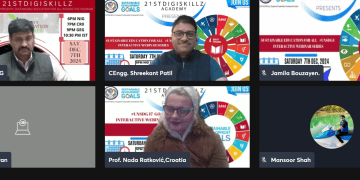Written by: Aditya Patil – PARENTNashik
A global webinar hosted by 21st Digi Skillz focused on the United Nations Sustainable Development Goal (SDG) 4 – Quality Education. Under the theme “Sustainable Education,” the event brought together experts, policymakers, and thought leaders to explore innovative strategies and frameworks aimed at achieving inclusive and equitable education for all.
The webinar, held from 10:30 AM to 12:00 PM IST, attracted a global audience. Dr. Uche Lin Okpala served as the host, with Prof. Nada Ratković Kovačević moderating the discussions. Distinguished speakers included Engg Shreekant Patil from India, who highlighted India’s initiatives under its National Education Policy (NEP) 2020 to align education with global sustainability goals, and Dr. Neyara Radwan from Egypt, who presented a case study on Finland’s success in creating an inclusive and innovative education system.
Engg Shreekant Patil emphasized the importance of India’s NEP 2020 in fostering holistic learning and supporting SDG 4 objectives. He highlighted several government initiatives aimed at empowering youth, promoting entrepreneurship, and enhancing skill development. Key recommendations from his presentation included policy integration to adopt sustainability-focused policies in education, global partnerships to share resources and expertise, climate change education to prepare students for environmental challenges, leveraging technology to enhance accessibility and inclusivity, upskilling educators to incorporate sustainability principles into teaching, and engaging young people in shaping sustainable education policies.
Shreekant Patil detailed several initiatives under India’s NEP 2020 designed to support SDG 4, including Swachh Vidyalaya Abhiyan to promote clean and green school environments, Beti Bachao Beti Padhao for advancing gender equality in education, digital education platforms like PM eVIDYA and SWAYAM, and sustainable infrastructure incorporating green technologies in schools to promote environmental consciousness. Other key programs included the National Educational Technology Forum (NETF), the Gender Inclusion Fund (GIF), and foundational literacy and numeracy missions like NIPUN Bharat.
The event also featured insights from global leaders, who shared strategies for achieving SDG 4 through international cooperation. Speakers included Dr. Neyara Radwan (Egypt), Mansoor Shah (Pakistan), Dr. G. Harikrishnan (India), Prof. Nada Ratković Kovačević (Croatia), Prof. Dr. (hc) Amb. KMA CPA Shainul B. (Tanzania), Hon. Prof. Riahi Hedia (Tunisia), Prof. Dr. Amb. Mehreen-Mia Hc (South Africa), Nebhat Ozaydin Cankirli (Turkey), Amb. Saphal Dhungana (Nepal), and Jamila Bouzayen (Tunisia).
In his closing statement, Engg Shreekant Patil invited global leaders to collaborate with India to build sustainable educational ecosystems. He reaffirmed his commitment to advancing SDG 4 through entrepreneurship, research, and skill development, and expressed gratitude to the event organizers for facilitating meaningful discussions on sustainable education.
This webinar underscored the importance of collective efforts and international partnerships in achieving SDG 4 and advancing sustainable education globally.
Contact Information:
PARENTNashik
Aditya Patil – Manager
Discover top stories in supply chain logistics news on The Supply Chain Report. For free tools related to international trade, visit ADAMftd.com.
#SDG4 #SustainableEducation #GlobalPartnerships #QualityEducation #EducationalInnovation















